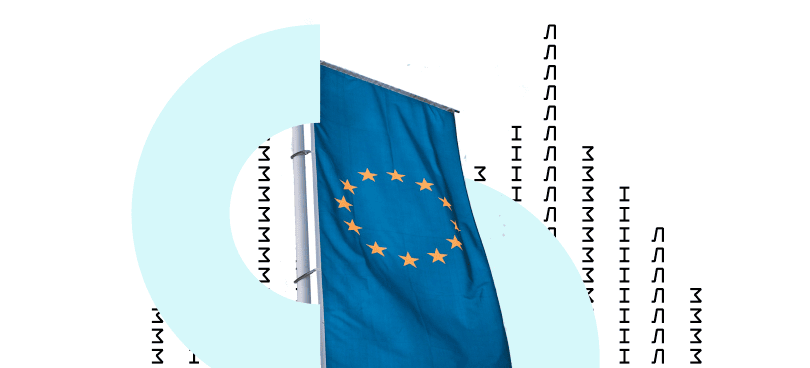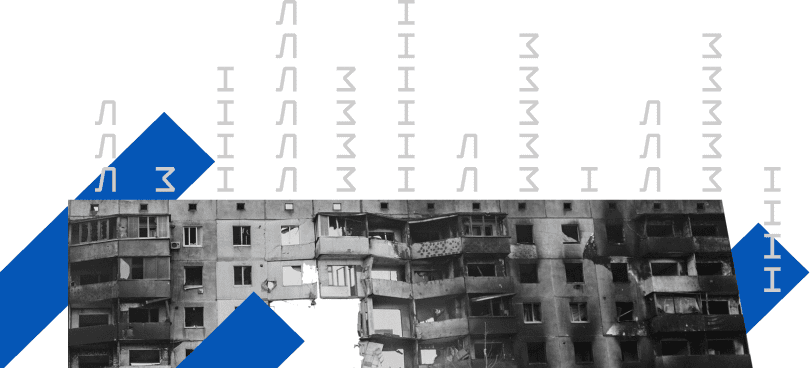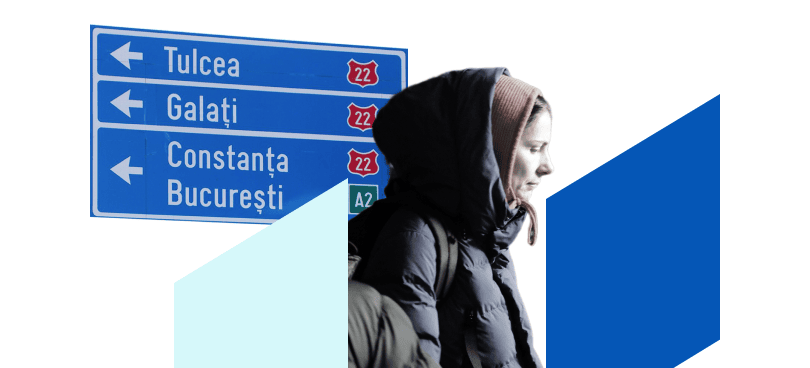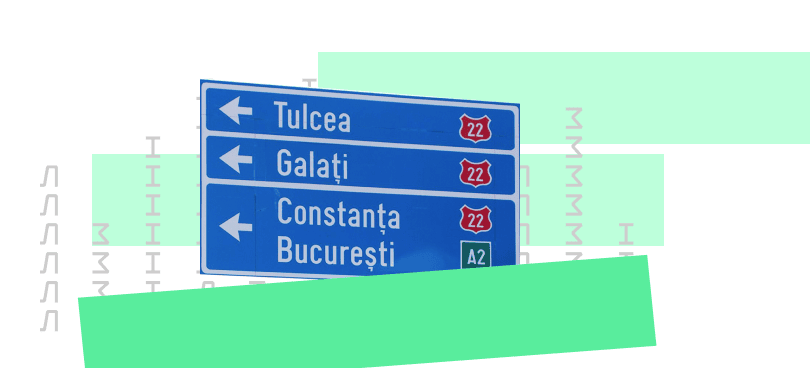Article by the Agency for Legislative Initiatives (ALI) for the Decentralisation portal.
Providing social services is an important function of any state. However, during the war, the number of people who need support increases manifold. For instance, during the one and a half years of the war, the number of people with disabilities increased by 300,000, reaching 3 million people in total. Russian aggression against Ukraine has been causing untold losses – both human and material. Ukrainians have had to face destroyed infrastructure, loss of homes, vehicles, jobs, just basic means of subsistence. A huge number of people have left their homes. According to the latest data, there are about 5 million such people. Given that the war is still going on, the number of people in need of aid may continue to grow. The Agency for Legislative Initiatives has tried to find out what procedures exist today for providing social services to vulnerable populations and what challenges remain.
What were the procedures for providing social services before martial law declaration?
Social services, according to the current Law of Ukraine, “On Social Services”, are actions aimed at preventing difficult life circumstances, overcoming such circumstances or minimising their negative consequences for individuals/families who are in them. Difficult life circumstances (DLC) are defined as circumstances that have a negative impact on the life, health and development of an individual or the functioning of a family which they cannot overcome on their own. Such circumstances include loss of job, loss of home or other damage caused by fire, natural disaster, man-made disaster, hostilities, terrorist act, armed conflict, or temporary occupation.
To receive a free social service, a person had to contact the Department of Social Protection of the Population, which was supposed to analyse the needs and refer such a person to the appropriate service provider. As a rule, such providers are Social and Psychological Support Centres, Mother and Child Care Centres, Comprehensive Rehabilitation Centres for Persons with Disabilities, etc. At the same time, the responsibility for assessment, planning and provision of social services, in accordance with the law, rests with local self-government bodies. In addition, according to the Law “On Social Services”, 18 basic social services are to be provided precisely at the community level. It is worth noting that not all citizens had the right to receive social services for free. In order to receive the service for free, among other things, a preliminary analysis was conducted, and various factors were taken into account: income level, presence of family members/relatives, etc.
The social services themselves were provided according to the procedure (case management), which included a number of stages, in particular, the analysis of a person’s application/request for the provision of social services, assessment of a person’s/family’s needs for social services; determination of the average monthly total income of the applicant; making a decision on the provision of social services taking into account the individual needs of the person/family; development of an individual plan (that is, specific steps that should potentially help a person overcome difficult life circumstances); concluding an agreement on the provision of social services. Relevant agencies are given 10 working days to decide on the provision of social services. The procedure changes only in the case of one-time or emergency provision of social services (that is when they are provided immediately, mostly within 24 hours, if there is a threat to the recipient of social services).
Changes under martial law
After February 24, 2022, it became clear that there was no time to complete all the formal procedures, and the Ministry of Social Policy developed recommendations for organising the provision of social services under martial law conditions as early as March 2022. They involved the streamlining and optimisation of the procedure for providing certain social services. One of the key methodological recommendations for local authorities was to provide social services in an emergency (crisis) manner instead of using the full procedure. This type of service provision allows one to make a decision within 24 hours from the moment of receiving the relevant application, request, notification about the need to provide assistance to a person.
However, to optimise the service provision procedure further, regulatory changes are needed. According to the Resolution of the Cabinet of Ministers of Ukraine (CMU) of June 1, 2020, “On the Organisation of the Provision of Social Services” and the Order of the Ministry of Social Policy of June 23, 2020 “On the Approval of the Classifier of Social Services”, there were only a small number of services that could be provided on an emergency basis. Therefore, in March last year, they first adopted CMU Resolution No. 294 of March 16, 2022, which amended the Procedure for Providing Social Services to Persons with Disabilities and Elderly Persons Suffering from Mental Disorders. Such social services as inpatient care (creating living conditions; food provision), palliative care (assistance in obtaining pain relief), care at home, supported living (provision of accommodation, development and maintenance of self-care skills and other skills necessary for independent living) can now be provided as emergency assistance. Subsequently, the CMU Resolution No. 560 of 05/07/2022 was adopted, which supplemented the previous amendments to the Procedure. As a result, it was clarified that social services might be provided on an emergency (crisis) basis in the event of a threat to a person’s life or health and during a state of emergency or martial law in Ukraine or some of its localities. In addition, 11 services previously provided on a case-by-case basis have been added to existing emergency services during martial law. In the summer of 2022, the same norms were then included in the CMU Resolution “On the Organisation of the Provision of Social Services” and could already be applied to all persons in difficult life circumstances.
Also, on April 14, 2022, the Verkhovna Rada of Ukraine adopted amendments to the Law of Ukraine “On Social Services”, streamlining some norms to optimise the provision of social services. Namely, it:
- increased the powers of local authorities: they were given the right to determine the specifics of the organisation and provision of social services in the territory of the relevant community in the event of the declaration of a state of emergency or martial law. However, this should not contradict the logic of the law and legal norms.
- social services are provided on an emergency (crisis) basis during the period of martial law;
- all social services are provided free of charge to persons (regardless of their income level) who have been harmed by a fire, natural disaster, man-made disaster, hostilities, terrorist act, armed conflict, or temporary occupation;
- the definition of the aggregate income of citizens for the identification of low-income persons was changed. From that moment, the average monthly aggregate income of citizens is determined, taking into account the most recent quarter and not the most recent six months (as it was before).
Also, in August 2023, the Order of the Ministry of Social Policy, “On Approval of the Procedure for Determining the Needs of the Population of an Administrative-Territorial Unit/Territorial Community for Social Services”, came into force. It sets out the procedure for determining the population’s needs for social services during martial law or state of emergency, as well as in the transition period after its termination. The Procedure considers all the changes that were adopted in the previous regulations.
During the first six months of the war, the demand for social services increased by the factor of 2 to 4 when compared to pre-martial law period. Expenditures of local budgets on the social issues ranged from 3 percent to 13 percent of the total. At the same time, the volume of provided social services does not directly correlate with the volume of social expenditures per capita in a region. This is due to the fact that the majority of social expenditures are directed to wages – from 79 percent to 98 percent of the total. On average, less than 10 percent of social expenditures are directed to the organisation and provision of social services. As noted by the Ministry of Social Policy itself, this calls for the introduction of changes in the policy of developing the system of providing social services.
Today, there are legislative mechanisms that allow to involve representatives of the non-government sector as providers of social services. In particular, it can be done through social service procurement. However, the mere presence of legislative mechanisms does not allow it to be applied to the full extent since the involvement of the non-government sector in the provision of social services is weak. Currently, the synchronisation of the efforts of the government and non-government sectors is aimed, in particular, at the financial support of non-government associations of persons with disabilities who can provide social services at the socialisation and integration of such persons into society. On January 27, 2023, the Cabinet adopted the Resolution “Some Issues of Providing Financial Support to Non-Government Associations of Persons with Disabilities,” which provides an opportunity to direct funds from the state budget to support NGAs, ensure a transparent mechanism for the use of funds and improve the provision of social services to persons with disabilities. The resolution also establishes the requirements and criteria for the participation of non-government associations of persons with disabilities in the competition to determine projects for the implementation of which financial support will be provided.
Challenges of the social sphere: where do we stand as of now?
Changes in the legislation in the field of social services were necessary overall with the onset of a full-scale invasion. Still, the state was mostly unprepared for the challenges of war. This also applies to the system of social services. In addition, there are still problems in the area of legislation implementation. These are:
Unequitable access of citizens to social services. According to research results, in 2022, one social service provider could serve from several thousand people to several hundred thousand depending on the region. This also leads to deterioration of the quality of social services.
Resource shortage. This applies to both human resources and material support (shelter, fleet vehicles, technical equipment). In some communities, this problem existed even before the full-scale war. At the same time, according to research, despite the acute shortage of social workers, there are few such vacancies. This is explained by the so-called phenomenon of “hidden vacancies,” when while there are vacancies in the organisation, information about them is not made public. On the one hand, this may happen in the case of management’s expectations that a person (for example, one who received IDP status) can return to his/her position. On the other hand, this practice may have certain ulterior motives when the management has a desire to employ a relative or acquaintance. Also, the duties of an absent employee can be distributed among other employees (for example, a person can both coordinate the process of social services and provide them directly).
The last phenomenon can also be explained by the problem of low labour compensation. After all, as of today, the average salary of a social worker is approximately UAH 9,000. However, the amount of the salary varies depending on the communities, and can be even lower than UAH 6,000. Considering the social importance of this work and the strenuous effort it requires, low salaries do not encourage people to work in this field.
Low involvement of the non-government sector in the provision of social services. Although the Ministry of Social Policy officially implements the policy of such cooperation, not all communities use the existing mechanisms and opportunities. In Ukraine, most social services are provided by government or municipal organisations and enterprises. Government/municipal enterprises or organisations and their branches currently constitute 77 percent of such providers according to the Register of the Ministry of Social Policy. Meanwhile, non-governmental and charitable organisations make up only 14 percent of all registered social service providers in Ukraine. This problem has a long history because the mechanisms for the involvement of non-government organisations were first provided for in the legislation almost 20 years ago. Therefore, its solution requires active work with both authorities and the non-government sector.
The procedure for determining the need for social services during martial law needs to be revised. After all, according to the procedure, the monthly analysis regarding the provision of social services to persons is carried out only for emergency services. At the same time, data on other services are not updated during martial law. It is important to consider that the number of IDPs who need various social services has increased in the rear area communities, and active migration processes force a systematic accounting of such citizens to determine their actual needs.
This material was prepared with the support of the International Renaissance Foundation. The material represents the opinions of the authors and does not necessarily reflect the opinion of the International Renaissance Foundation.















